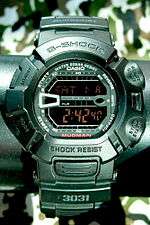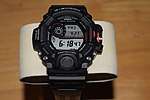Master of G
The Master of G is a collection of G-Shock watches produced by Japanese corporation Casio. There are several models and they were designed for usage in harsh environments. Many showcase new technology that Casio would eventually introduce into the G-Shock and ProTrek line of watches; such as an altimeter, digital compass and Tough Solar feature.
History
The Master of G series began in 1985 with the G-Shock II DW-5500C. This was a classic square G-Shock, but the bezel contained softer parts and slipped over the buttons. This way Casio created a Mud Resistant structure. The DW-5500C was therefore nicknamed "Mudman".
On November 1993, Casio released the Frogman model in Japan; the case-back featured the word "FROGMAN" and a small figure of a diving frog. It was made for divers; it featured a unique asymmetrical design of thick rubber shielding around a self-contained module. It came with a titanium screw-back case - an unusually high-cost design. It had a thick double-tang resin strap. A digital feature was dive timing. The Frogman proved to be very popular and at some point between then and 1995 Casio decided to produce more high-end premium models (including limited edition colours that in some cases have become very valuable).
The Master of G watches ceased production in 2000, but there are signs Casio is keen to keep the range alive, not just with limited edition releases but with re-designs of some of the old Masters.
In 2006, new Mudman models were released, followed by new Gulfman models in 2007.
Three of the current Masters of G have been included in a new collection launched on February 2009, the Men In Rusty Black (MIRB) series. The watches under this theme, which include the Riseman (GW-9200MS), the Frogman (GW-200MS) and the Mudman (G-9000MS). They feature a military-inspired look.
Characteristics
Master of G series watches are invariably amongst the largest G-Shock designs Casio produces, usually suited for those with larger wrists. They almost always named with a "man" suffix, after the initial Frogman model which itself was named for scuba divers. Three models, the Mudman, Gaussman, Raysman and Rangeman all feature a thick rubber outer layer that surrounds the buttons and case completely, ensuring they offer mud-resistance. The Gaussman was also ISO-certified anti-magnetic.
Most models consist of a steel case surrounded by a thick neoprene or polyurethane bezel and outer protection. All models except the earliest Frogmen feature Casio's Illuminator display lighting system and are water resistant to 20 atmospheres (20bar/200metres), and are thus suitable for scuba-diving except at depths requiring helium-oxygen gas.
Some of the modules incorporate highly advanced functions. The Riseman featured twin sensors that measured both temperature and atmospheric pressure, thus allowing it to serve as a barometer and altimeter. The Raysman was the first model to make use of Tough Solar technology to power its functions, the Wademan featured a digital compass, the Fisherman helped introduce the now-common tide graph and moonphase readouts, and the Antman was the first watch Casio made that received an atomic signal that calibrated its timekeeping with atomic clock transponders in Japan.
Today, it is not unusual for two or more of these features to be found in a single Master of G model i.e. the current GW-9200 Riseman has Tough Solar to power its radio-calibrated timekeeping and thermometer/altimeter/barometer functions; the GWF-1000 Frogman and GW-9110 Gulfman both feature solar power, radio timekeeping and tide and moon phase indicators. The current GW-9400 Rangeman with triple sensors has the most extensive feature sets so far, with mud/dust resistance, solar power, radio timekeping, thermometer, barometer, altimeter, and digital compass functions, which have long been provided on Protrek/Pathfinder series. The GPR-B1000, which is the successor to the GW-9400, and is also named Rangeman, has advanced GPS functionality in addition to the triple sensor features of its predecessor, but it has yet to be released commercially.
Collectibility
Because they are no longer in production most of the Masters series command strong resale values; examples in NOS (New Old Stock) condition command a premium. Prices are sometimes higher outside Japan, not least because many models were produced only for the domestic market rather than for North America and Europe.
There have been several limited editions of the Masters series, and depending on their scarcity these command some of the highest prices for any of Casio watches. The Men in Black and Men in Yellow series are black and yellow versions of the Masters and typically command anywhere between two and three times the resale value of the regular versions. Some models such as the "Brazilian" Frogman and A.R.T.P.I Wademan are even scarcer and can command even higher prices, though their value is hard to predict as there are limited numbers and the price is largely determined by demand from individual collectors.
Although not always available, all models are usually valued at 500 USD or less, providing an affordable alternative to the collecting of prestige watches.
Models
- Antman, discontinued –
- Codename, discontinued –
- Fisherman, discontinued –
- Frogman, current models are GWF-1000 (atomic) and GF-1000 (non-atomic)
- Seaman, discontinued
- Gaussman, discontinued –
- Gulfman, current model is GW-9110 (atomic)
- Gulfmaster, current model is GWN-1000 (atomic)
- Lungman, discontinued –
- Mudman, current models are G-9000MS-1,[1] GW-9300 (atomic) and G-9300 (non-atomic)
- Mudmaster, current model is GWG-1000 (atomic)
- Rangeman, current models are GW-9400-1 (Black), −3 (Khaki), GPR B-1000 (GPS capability) [2]
- Raysman, discontinued –
- Revman, discontinued –
- Riseman, current models are GW-9200 (atomic) and G-9200 (non-atomic)
- Wademan, discontinued –
Gallery
- Frogman GWF-1000BP-1JF
 Mudman G9000MS-1
Mudman G9000MS-1- Rangeman GPR-B1000-1ER
 Rangeman GW-9400J-1JF
Rangeman GW-9400J-1JF- Riseman GW-9200J-1JF
